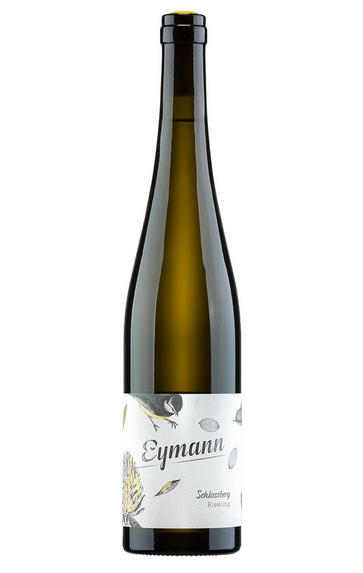
2020 Riesling, Trocken, Schlossberg, Eymann, Pfalz, Germany
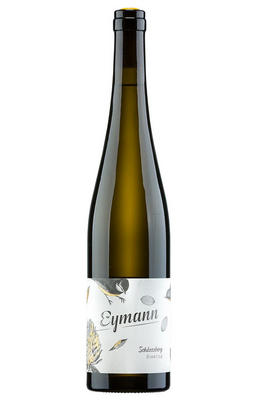
About this WINE
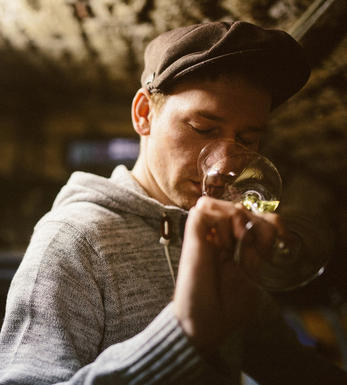
Weingut Eymann
Weingut Eymann winery is located in the Pfalz wine region of Germany and is known for its commitment to organic and biodynamic winemaking practices. The Eymann family has a long history of winemaking, with the estate dating back to 1782. What sets them apart is their dedication to sustainability and environmental responsibility.
The winery's vineyards are certified organic and biodynamic, reflecting their holistic approach to viticulture. These practices prioritize the well-being of the land, resulting in high-quality, terroir-driven wines that truly express the character of the region. Weingut Eymann specializes in Riesling and other grape varieties such as Pinot Noir and Chardonnay. Their wines are celebrated for purity, elegance, and a solid connection to the terroir.
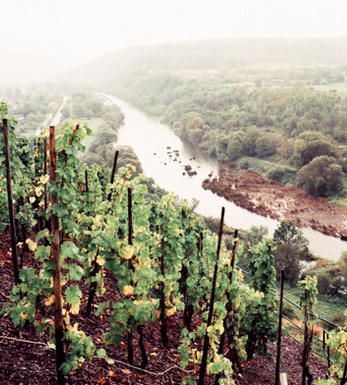
Germany
The 102,000 hectares of German vineyards produce some of the world’s greatest white wines from the Riesling grape. With a run of excellent vintages, top estate wines are at long last fashionable, with Riesling finally getting the acknowledgment it deserves. Its touch of sweetness is underpinned by a racy acidity and a fresh purity from the fruit.
Germany is the tenth largest wine-producer in the world. Its vineyards are centred around the major rivers – ie the Rhine and the Mosel – as well as their tributaries. The continental climate with its hot summers, cold winters and long, warm autumns is perfect for late-harvest wines. The finest examples are produced on steep, often terraced, south-facing vineyards close to the rivers. The maintenance and the harvesting of the vines are often done by hand.
White grapes make up 64 percent of plantings, with the proportion of red grapes increasing. Riesling has a knack of maintaining its varietal character while reflecting the terroir of its site, so while all German Rieslings have that balance of nerve-tingling pure fruit and refreshing acidity, there are definite regional differences.
The steep, slaty slopes of the Mosel Valley produce the lightest, most mineral Rieslings, with firm, steely examples coming from its tributaries, the Saar and Ruwer. The south-facing slopes of the Rheingau are drier and sunnier, so the wines there are fuller. The underrated Nahe lies in between the Mosel and Rheingau both stylistically and geographically, while the large Rheinhessen region can produce firm, full and racy Rieslings. The Pfalz further south is warmer, hence its wines are richer.
Traditional wines have a degree of sweetness but there has been a move towards dry and medium-dry styles (ie trocken and halbtrocken), which made up just over 65 percent of production in 2012.
In an effort to help consumers distinguish dry wines from sweet, the Association of German Prädikat Estates or Verband der Prädikatsweingüter (VDP in German), an organization of almost 200 wineries, decided to introduce a classification system. The objective was to restore the prestige of significant vineyards across Germany: Erste Lage (First Site) and Grosse Lage (Grand/Great Site) refer to the best of the best German wines, made with terroir, regionality and traditional taste criteria in mind. Wines at this level must adhere to a number of regulations, ensuring the quality of bottles bearing the name of an Erste or Grosse Lage.
If the Lage is made in a dry style, it will be classed as either Erstes Gewächs (Premier Growth) or Grosses Gewächs (Grand/Great Growth). Erstes and Grosses Gewächs are premium and super-premium dry wines produced according to strict high standards, handcrafted by Germany’s finest wine-growers. The term promises us fully-fermented, dry wines from the top vineyard sites across Germany. The wines of this exclusive category are from the finest parcels sites and are subject to even stricter production criteria. Grosses Gewächs are some of the greatest dry white wines in the world; powerful, concentrated and saturated with mineral complexity.
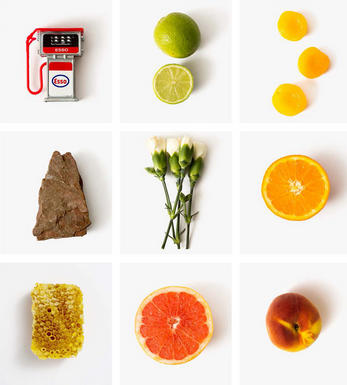
Riesling
Riesling's twin peaks are its intense perfume and its piercing crisp acidity which it manages to retain even at high ripeness levels.
In Germany, Riesling constitutes around 20% of total plantings, yet it is responsible for all its greatest wines. It is planted widely on well-drained, south-facing slate-rich slopes, with the greatest wines coming from the best slopes in the best villages. It produces delicate, racy, nervy and stylish wines that cover a wide spectrum of flavours from steely and bone dry with beautifully scented fruits of apples,apricots, and sometimes peaches, through to the exotically sweet flavours of the great sweet wines.
It is also an important variety in Alsace where it produces slightly earthier, weightier and fuller wines than in Germany. The dry Rieslings can be austere and steely with hints of honey while the Vendages Tardives and Sélection de Grains Nobles are some of the greatest sweet wines in the world.
It is thanks to the New World that Riesling is enjoying a marked renaissance. In Australia the grape has developed a formidable reputation, delivering lime-sherbet fireworks amid the continental climate of Clare Valley an hour's drive north of Adelaide, while Barossa's Eden Valley is cooler still, producing restrained stony lime examples from the elevated granitic landscape; Tasmania is fast becoming their third Riesling mine, combining cool temperatures with high UV levels to deliver stunning prototypes.
New Zealand shares a similar climate, with Riesling and Pinot Gris neck to neck in their bid to be the next big thing after Sauvignon Blanc; perfectly suited is the South Island's Central Otago, with its granitic soils and continental climate, and the pebbly Brightwater area near Nelson. While Australia's Rieslings tend to be full-bodied & dry, the Kiwis are more inclined to be lighter bodied, more ethereal and sometimes off-dry; Alsace plays Mosel if you like.


Buying options
Add to wishlist
Description
Weingut Eymann is one of the rising stars of the Pfalz and a trailblazer for German organics (1982) and biodynamics (2006). Without doubt their finest vineyard is the terraced (Wachenheimer) Schlossberg. High in altitude, with sandstone soils and some very old un-grafted vines, Schlossberg produces immaculate fruit at naturally low yields. A perfect fruity but dry Riesling for those who might find young Grosses Gewächs too challenging.
Drink 2023 - 2033
Edward Richardson, Private Client Manager, Berry Bros. & Rudd (April 2022)
wine at a glance
Delivery and quality guarantee